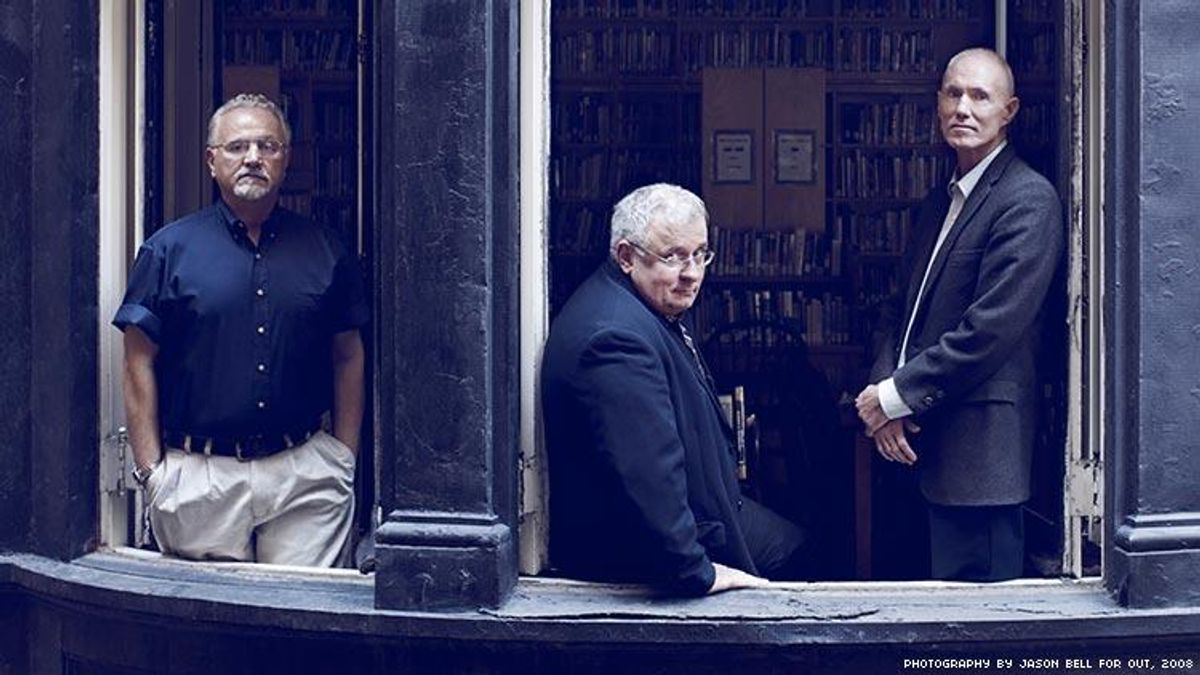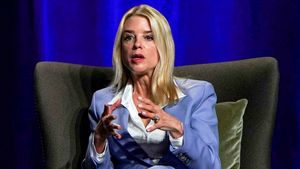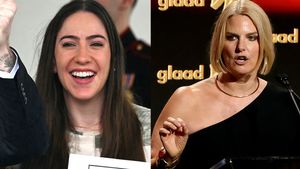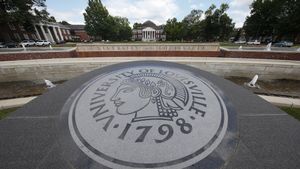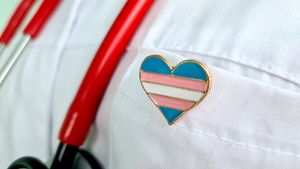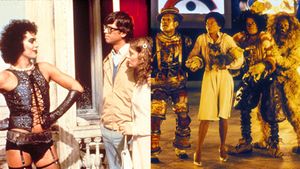Donna Summer started to coo, signaling, as she's done for decades, the end of the party. A collective wail arose from the crowd. Five minutes in -- the DJ was playing the only acceptable version of "Last Dance," the no-holds-barred, eight minute-plus, 12-inch mix -- I'm sitting on one of the giant speakers flanking the dancefloor, fan in hand, lip-syncing for my life: "I need you by me, beside me, to guide me." The elder gays cheered as my 24-year-old self was discovering the transcendent joys of a summer in Provincetown. As the song kicked in for the final sprint, I jumped off the speaker, twirling into the crowd, our arms waving madly in the shared freedom of being gay, being in paradise, listening to the sound of our boundless joy, pouring over us, and imploring "dance with me, dance with me, dance with me."
That magical first summer in P-town, almost ten years ago, I also discovered Andrew Holleran's Dancer from the Dance, a gay novel that was post-Stonewall and pre-AIDS, a brief but crucial time between liberation and epidemic. Holleran's work, often considered among the finest in queer literature, explored what it meant to be a gay man who was free, finally, to be gay, despite society's objections, and what one does with that freedom.
"We're completely free," says protagonist Malone, "and that's the horror."
When I first read Dancer from the Dance, in the throes of a post-paradise depression, I was enthralled. The characters reminded me of my friends and myself -- a precocious group of twenty-somethings repeating jokes older than we were, in constant search for the perfect party, the perfect music, and the perfect partner. Then, Dancer from the Dance felt like a revelation, speaking to my loneliness and my desperate hunger to find someone to affirm my place in the world. But age changes one's priorities and perspective.
Throughout Dancer from the Dance, Malone is a Christ-like figure, a devastatingly handsome, well-educated, well-mannered, universally loved and sought-after corporate lawyer from a good family (class is incredibly important to Holleran's characters) who we're led to believe is a hopeless romantic, falling in love with every dark-eyed Puerto Rican boy on the Lower East Side. The narrator, an unknown but omniscient queen who runs in the same social circle, deifies Malone, referring to him as "fantasy-made-flesh," "the central beautiful symbol," and the "central symbol on which all of it [their gay existence] rested."
Malone is simultaneously idol and cautionary tale. Suffering from a crippling loneliness, he gives up his lawyer life in Maryland and moves to New York, essentially dropping out of society, to seek love, full time.
Malone soon joins a cabal of zombie homosexuals whose lives are empty and fragile and almost entirely defined by sex, all the while finding the only true manifestation of their freedom at their house of worship, the discotheque Twelfth Floor, with Patti Jo's "Make Me Believe in You" underscoring their wild-eyed search for a nebulous sort of love with the oft-repeated lyrics, "Make me believe in you / Show me your love can be true."
Yet Dancer constantly conflates sex and love. Sex is the true and primary motivation in these characters' lives, but for all its descriptions of bus station blowjobs, picking pubic hair out of one's teeth, and fucking under park trees and in abandoned warehouses, Dancer from the Dance is remarkably unsexy, and rather garish. This is a sex equated with sin and devoid of passion; sex as a mechanical act performed out of necessity, like breathing, eating, and sleeping, but with a gnawing desperation, as if each man conquered provides a piece to a puzzle they can't hope to ever finish.
Holleran paints a beautiful but bleak picture of gay life in 1970s New York, capturing the timeless spirit of the city in summer, the heat palpable, rising from the sidewalks and radiating from the scores of gorgeous men casually haunting its streets, bars, and dancefloors, searching each other's eyes for possibility. But Holleran's depiction of gay life is very specific -- it's very white, it's very upper middle class, it's very melodramatic, and it's very depressing. Relationships are superficial and fleeting, predicated on nights spent in a popper-induced haze on the dancefloor:
Now of all the bonds between homosexual friends, none was greater than that between the friends who danced together. The friend you danced with, when you had no lover, was the most important person in your life...
Shortly after moving to New York, Malone falls for the volatile Frankie, a married subway employee from Bayonne, N.J., who leaves his wife and kid to be with Malone. They spend a blissful summer in some ramshackle dive above the West Side Highway, until Malone realizes that there are indeed other swarthy, dark-eyed homosexuals ready, willing, and able to fuck. After discovering his indiscretions, Frankie threatens to kill Malone, and Malone then runs away, finding solace in the opera-gloved hands of Sutherland, an extravagant queen who pals around with Egyptian heiresses and impressionable young millionaires he uses to fund his life of drugs and tireless leisure. Sutherland is particularly charming, even though he luxuriates in a casual racism, couched conveniently in playful imperiousness, that is indicative of his superior breeding: He calls black people "dinge," exclaims "a guinea hasn't got a heart!," and opines that the "real lovers" -- the ones who truly understand love -- are WASPs like him and Malone.
Sutherland serves as Malone's docent through the high-end/low-down Manhattan variety of homosexual life, shepherding him from party to party to gloryhole to bathhouse, and eventually serving as his pimp when this golden boy and symbol of everything good in his world wanders listlessly into a career as an escort, or as he calls himself, a "professional homosexual." By this point Malone has given up on his quest for love, choosing instead to wear the thorny crown of romantic martyr. His fall from grace -- as the anointed one, the most beautiful, the most perfect, the most Christ-like -- is the most precipitous.

He is the ultimate victim of the homosexual life because he is the ultimate homosexual. Malone's failure, then, to find love serves as a rebuff to all homosexuals, everywhere, as if to say, "If he can't, what chance do we mere mortals have?"
As I grew older and, despite my best efforts, remained single, I would point to Dancer from the Dance as a reminder that sadness and loneliness are an inextricable part of gay life. After all, even within the borders of paradise that first summer in P-town, I remember crying to a friend, wondering aloud why I couldn't find someone to love me. Each successive summer I would joke about walking into the ocean, as Malone ultimately does, never to be seen again. Dancer from the Dance, like most contemporaneous works that can be deemed gay, concerns the existential crisis of being homosexual. Malone is always searching for meaning in his life, and so he gives up one life to start a new one, one dedicated to a singular purpose: love.
But what does love look like when, for one's entire life, it has dared not speak its name? I'm lucky to have come of age at a period in our history when I didn't have to worry so much about what it meant to be gay. I could just be gay, or queer, or not even ascribe a label at all. I was able to come out as a teenager and find myself early on and in a way that these characters, and by extension gay men of the '70s, couldn't. Therefore I no longer view my inability to find love as a side-effect or an innate characteristic of being gay, as it is for Malone. People of my generation take for granted the freedom we have to define who we are. Maybe that's why, upon reappraisal, Malone's downward spiral doesn't fill me with empathy -- just frustration.
"Gay people secrete everything in each other's presence but tears...they come, piss and shit together, but they cry alone!" he laments. "When we're all so terribly alone. The least we can do in this life is love one another..."
It's a nice sentiment, but one that once seemed so much more profound because it came from a place of real emotion and real pain. From its first pages to its last, Dancer from the Dance is shrouded in death, a fact that -- given that the AIDS epidemic was just around the corner -- now appears bitterly ironic. Lovers overdose on drugs, houseboys get their heads blown off on St. Marks Place, beautiful youths slit their veins and jump off buildings, boys drown trying to sniff poppers at the bottom of a pool. Death, like sex, is made garish and over the top -- thus stripping both of their power -- and the two are linked, if not the same. Sunbathers lay feet away from a corpse as the narrator intones, "Death and desire, death and desire." One inevitably leads to the other.
Everyone admired Malone because he was polite and kind -- the quintessential all-American boy -- but mostly because he was beautiful, so beautiful they could willfully ignore the fact that he was a mess. He spends the entire novel trying to recreate a love he tired of by the changing of the season, only to realize...what? That love among homosexuals is impossible? It probably did feel impossible for a lot of gay men who were told their entire lives that something was wrong with them for feeling the way they did. But love starts from within.
By the publication of Dancer from the Dance, New York's annual Gay Pride parade had been in full swing for seven years, yet none of its characters ever march into the daylight, proclaiming their right to exist; instead, they slink through the night, lamenting their existence. In the book's epilogue, Holleran concedes that there were other kinds of homosexuals who led different lives just blocks away from them:
Do you realize what a tiny fraction of the mass of homosexuals we were?... I used to say there were only seventeen homosexuals in New York, and we knew every one of them; but there were tons of men in that city who weren't on the circuit, who didn't dance, didn't cruise, didn't fall in love with Malone.... We never saw them.
Part of my recent frustration with this book was that, re-reading it, I felt invisible, whereas it once made me feel truly seen. The gayness was so appealing, when it wasn't appalling, and reminded me of dancing in P-town, dancing on the Lower East Side in those wobbly years after college, finding solace in the opera-gloved hands of my own Sutherlands, and wanting to find somebody to believe in, someone to show me that love could be true. But past romanticism has failed me and now all I can see is the glaring omission of non-white characters, the fetishization of Latino men, and Malone suffering under the weight of his own privilege. Of course, this is a very 2018 view, one steeped in a political and social correctness that ebbs and flows with the tides and presidents. But it's also representative of how far we've come, in that simply existing in the shadows isn't enough. It's not even an option. Rather, we must loudly proclaim our identities, and live boldly, lest we be erased and altogether forgotten.
Still, some things haven't changed. Hookup apps have replaced New York's bathhouses and, to some extent, its gay bars. I know of many gay men around this city, and elsewhere, who suffer from a familiar kind of malaise, a gnawing search for something that looks like love but that they sate with sex, or drugs, or alcohol, or all of the above. The real difference is the freedom that comes with 40 years of change and perspective. The freedom to exist openly, to find love, to define love as we see fit. It's a hard-won freedom, one that requires constant vigilance, as we're reminded almost daily how fragile that freedom is.
For all its faults, Dancer from the Dance's greatest feat is capturing a lost time and the timelessness of dancing with the loves of your life to the greatest song in the greatest place at the greatest time of your life -- that brief freedom in which everything is right with the world and the world doesn't extend beyond the confines of the dancefloor.
